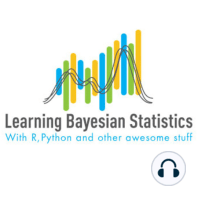47 min listen

#31 Bayesian Cognitive Modeling & Decision-Making, with Michael Lee
#31 Bayesian Cognitive Modeling & Decision-Making, with Michael Lee
ratings:
Length:
69 minutes
Released:
Jan 5, 2021
Format:
Podcast episode
Description
I don’t know if you noticed, but I have a fondness for any topic related to decision-making under uncertainty — when it’s studied scientifically of course. Understanding how and why people make decisions when they don’t have all the facts is fascinating to me. That’s why I like electoral forecasting and I love cognitive sciences.
So, for the first episode of 2021, I have a special treat: I had the great pleasure of hosting Michael Lee on the podcast! Yes, the Michael Lee who co-authored the book Bayesian Cognitive Modeling with Eric-Jan Wagenmakers in 2013 — by the way, the book was ported to PyMC3, I put the link in the show notes ;)
This book was inspired from Michael’s work as a professor of cognitive sciences at University of California, Irvine. He works a lot on representation, memory, learning, and decision making, with a special focus on individual differences and collective cognition.
Using naturally occurring behavioral data, he builds probabilistic generative models to try and answer hard real-world questions: how does memory impairment work (that’s modeled with multinomial processing trees)? How complex are simple decisions, and how do people change strategies?
Echoing episode 18 with Daniel Lakens, Michael and I also talked about the reproducibility crisis: how are cognitive sciences doing, which progress was made, and what is still to do?
Living now in California, Michael is originally from Australia, where he did his Bachelors of Psychology and Mathematics, and his PhD in psychology. But Michael is also found of the city of Amsterdam, which he sees as “the perfect antidote to southern California with old buildings, public transport, great bread and beer, and crappy weather”.
Our theme music is « Good Bayesian », by Baba Brinkman (feat MC Lars and Mega Ran). Check out his awesome work at https://bababrinkman.com/ (https://bababrinkman.com/) !
Thank you to my Patrons for making this episode possible!
Yusuke Saito, Avi Bryant, Ero Carrera, Brian Huey, Giuliano Cruz, Tim Gasser, James Wade, Tradd Salvo, Adam Bartonicek, William Benton, Alan O'Donnell, Mark Ormsby, Demetri Pananos, James Ahloy, Jon Berezowski, Robin Taylor, Thomas Wiecki, Chad Scherrer, Vincent Arel-Bundock, Nathaniel Neitzke, Zwelithini Tunyiswa, Elea McDonnell Feit, Bertrand Wilden, James Thompson, Stephen Oates, Gian Luca Di Tanna, Jack Wells, Matthew Maldonado, Ian Costley, Ally Salim, Larry Gill, Joshua Duncan, Ian Moran, Paul Oreto, Colin Caprani, George Ho, Colin Carroll and Nathaniel Burbank.
Visit https://www.patreon.com/learnbayesstats (https://www.patreon.com/learnbayesstats) to unlock exclusive Bayesian swag ;)
Links from the show:
Michael's website: https://faculty.sites.uci.edu/mdlee/ (https://faculty.sites.uci.edu/mdlee/)
Michael on GitHub: https://twitter.com/mdlBayes (https://twitter.com/mdlBayes)
Bayesian Cognitive Modeling book: https://faculty.sites.uci.edu/mdlee/bgm/ (https://faculty.sites.uci.edu/mdlee/bgm/)
Bayesian Cognitive Modeling in PyMC3: https://github.com/pymc-devs/resources/tree/master/BCM (https://github.com/pymc-devs/resources/tree/master/BCM)
An application of multinomial processing tree models and Bayesian methods to understanding memory impairment: https://drive.google.com/file/d/1NHml_YUsnpbUaqFhu0h8EiLeJCx6q403/view (https://drive.google.com/file/d/1NHml_YUsnpbUaqFhu0h8EiLeJCx6q403/view)
Understanding the Complexity of Simple Decisions -- Modeling Multiple Behaviors and Switching Strategies: https://webfiles.uci.edu/mdlee/LeeGluckWalsh2018.pdf (https://webfiles.uci.edu/mdlee/LeeGluckWalsh2018.pdf)
Robust Modeling in Cognitive Science: https://link.springer.com/article/10.1007/s42113-019-00029-y (https://link.springer.com/article/10.1007/s42113-019-00029-y)
This podcast uses the following third-party services for analysis:
Podcorn - https://podcorn.com/privacy
So, for the first episode of 2021, I have a special treat: I had the great pleasure of hosting Michael Lee on the podcast! Yes, the Michael Lee who co-authored the book Bayesian Cognitive Modeling with Eric-Jan Wagenmakers in 2013 — by the way, the book was ported to PyMC3, I put the link in the show notes ;)
This book was inspired from Michael’s work as a professor of cognitive sciences at University of California, Irvine. He works a lot on representation, memory, learning, and decision making, with a special focus on individual differences and collective cognition.
Using naturally occurring behavioral data, he builds probabilistic generative models to try and answer hard real-world questions: how does memory impairment work (that’s modeled with multinomial processing trees)? How complex are simple decisions, and how do people change strategies?
Echoing episode 18 with Daniel Lakens, Michael and I also talked about the reproducibility crisis: how are cognitive sciences doing, which progress was made, and what is still to do?
Living now in California, Michael is originally from Australia, where he did his Bachelors of Psychology and Mathematics, and his PhD in psychology. But Michael is also found of the city of Amsterdam, which he sees as “the perfect antidote to southern California with old buildings, public transport, great bread and beer, and crappy weather”.
Our theme music is « Good Bayesian », by Baba Brinkman (feat MC Lars and Mega Ran). Check out his awesome work at https://bababrinkman.com/ (https://bababrinkman.com/) !
Thank you to my Patrons for making this episode possible!
Yusuke Saito, Avi Bryant, Ero Carrera, Brian Huey, Giuliano Cruz, Tim Gasser, James Wade, Tradd Salvo, Adam Bartonicek, William Benton, Alan O'Donnell, Mark Ormsby, Demetri Pananos, James Ahloy, Jon Berezowski, Robin Taylor, Thomas Wiecki, Chad Scherrer, Vincent Arel-Bundock, Nathaniel Neitzke, Zwelithini Tunyiswa, Elea McDonnell Feit, Bertrand Wilden, James Thompson, Stephen Oates, Gian Luca Di Tanna, Jack Wells, Matthew Maldonado, Ian Costley, Ally Salim, Larry Gill, Joshua Duncan, Ian Moran, Paul Oreto, Colin Caprani, George Ho, Colin Carroll and Nathaniel Burbank.
Visit https://www.patreon.com/learnbayesstats (https://www.patreon.com/learnbayesstats) to unlock exclusive Bayesian swag ;)
Links from the show:
Michael's website: https://faculty.sites.uci.edu/mdlee/ (https://faculty.sites.uci.edu/mdlee/)
Michael on GitHub: https://twitter.com/mdlBayes (https://twitter.com/mdlBayes)
Bayesian Cognitive Modeling book: https://faculty.sites.uci.edu/mdlee/bgm/ (https://faculty.sites.uci.edu/mdlee/bgm/)
Bayesian Cognitive Modeling in PyMC3: https://github.com/pymc-devs/resources/tree/master/BCM (https://github.com/pymc-devs/resources/tree/master/BCM)
An application of multinomial processing tree models and Bayesian methods to understanding memory impairment: https://drive.google.com/file/d/1NHml_YUsnpbUaqFhu0h8EiLeJCx6q403/view (https://drive.google.com/file/d/1NHml_YUsnpbUaqFhu0h8EiLeJCx6q403/view)
Understanding the Complexity of Simple Decisions -- Modeling Multiple Behaviors and Switching Strategies: https://webfiles.uci.edu/mdlee/LeeGluckWalsh2018.pdf (https://webfiles.uci.edu/mdlee/LeeGluckWalsh2018.pdf)
Robust Modeling in Cognitive Science: https://link.springer.com/article/10.1007/s42113-019-00029-y (https://link.springer.com/article/10.1007/s42113-019-00029-y)
This podcast uses the following third-party services for analysis:
Podcorn - https://podcorn.com/privacy
Released:
Jan 5, 2021
Format:
Podcast episode
Titles in the series (100)
#12 Biostatistics and Differential Equations, with Demetri Pananos by Learning Bayesian Statistics